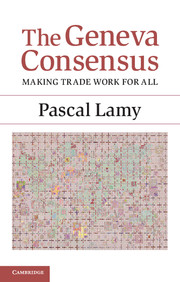Book contents
- Frontmatter
- Contents
- Preface
- 1 Harnessing globalization amid the crisis facing multilateralism
- 2 The changing face of trade
- 3 Helping the poorest up the prosperity ladder
- 4 Trade: friend not foe of the environment
- 5 Trading towards global food security
- 6 Trade can contribute towards better health
- 7 Trade and labour: separated at birth, but still connected
- 8 Trade and energy: the case for a greater WTO role
- 9 Trade and currencies: trading community seeks greater currency stability
- 10 Trade and competition: fairer competition makes for fairer trade
- 11 Trade and human rights: a case of misplaced suspicion
- 12 Corruption: a cancer that trade transparency can help to treat
- 13 Last but not least: the Doha Round
- Epilogue
- Index
6 - Trade can contribute towards better health
Published online by Cambridge University Press: 18 December 2013
- Frontmatter
- Contents
- Preface
- 1 Harnessing globalization amid the crisis facing multilateralism
- 2 The changing face of trade
- 3 Helping the poorest up the prosperity ladder
- 4 Trade: friend not foe of the environment
- 5 Trading towards global food security
- 6 Trade can contribute towards better health
- 7 Trade and labour: separated at birth, but still connected
- 8 Trade and energy: the case for a greater WTO role
- 9 Trade and currencies: trading community seeks greater currency stability
- 10 Trade and competition: fairer competition makes for fairer trade
- 11 Trade and human rights: a case of misplaced suspicion
- 12 Corruption: a cancer that trade transparency can help to treat
- 13 Last but not least: the Doha Round
- Epilogue
- Index
Summary
Anyone who has travelled widely in sub-Saharan Africa can have been left in little doubt about the catastrophic impact of the HIV/AIDS pandemic. From Uganda to South Africa, thousands of people, including small children, still die every day from the disease. I was devastated to see the suffering caused by HIV/AIDS during a trip to Southern Africa in 2001. And yet, thanks to an unprecedented UN-led global effort, the situation is beginning to improve as more and better drugs become available worldwide and global prevention programmes become more effective. But for a long time economic development was hampered and in some parts of Africa sent into reverse as the virus cut down men and women of working age. In many developing countries, HIV piled a huge new burden on already struggling or inadequate health and social services.
Global public health is a complex and teasing challenge, involving effective use of the full set of policy tools, both national and international. Trade is one of them, and within it, access to essential medicines for all remains the goal. Achieving it requires action across a wide front, from encouraging needed innovation, both medical and technological, to improving systems of health delivery. As the global disease burden evolves, so does the requirement for new and suitable medicines and technologies.
- Type
- Chapter
- Information
- The Geneva ConsensusMaking Trade Work for All, pp. 81 - 94Publisher: Cambridge University PressPrint publication year: 2013



